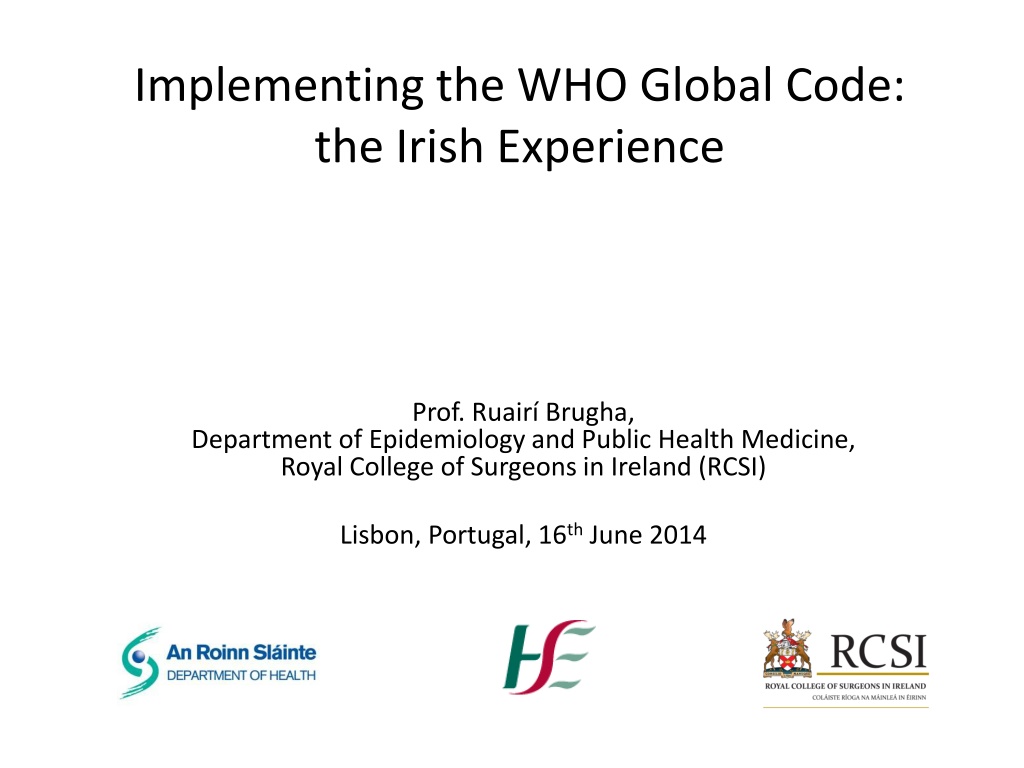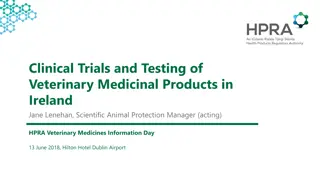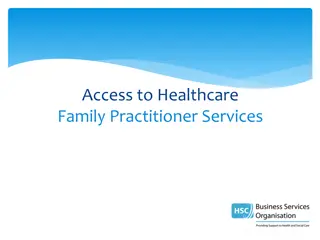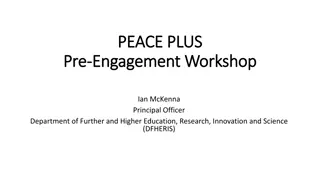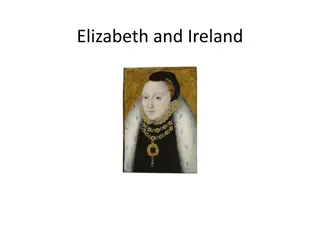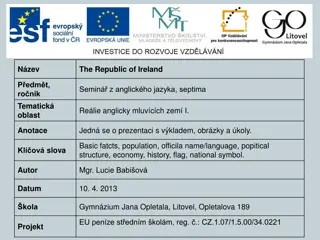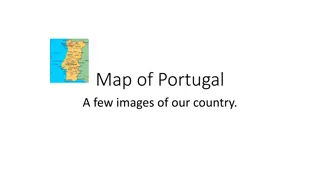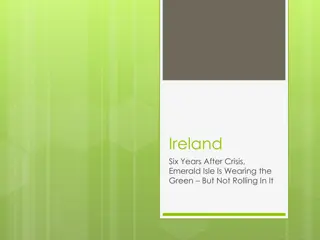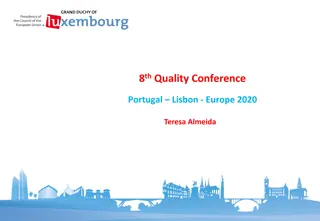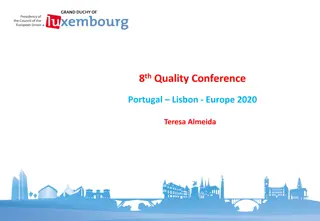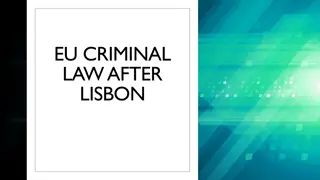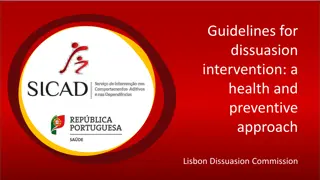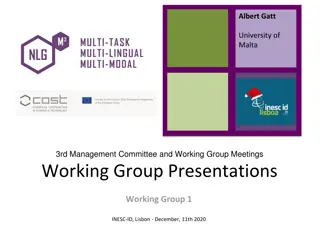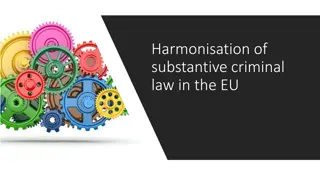Implementing the WHO Global Code: The Irish Experience
The Irish experience in implementing the WHO Global Code focuses on ethical recruitment and strengthening health systems. Challenges faced in Ireland between 2000-2013 include a significant presence of foreign-trained doctors and nurses, economic crises leading to workforce reductions, and recruitment and retention issues in the healthcare sector.
Download Presentation

Please find below an Image/Link to download the presentation.
The content on the website is provided AS IS for your information and personal use only. It may not be sold, licensed, or shared on other websites without obtaining consent from the author. Download presentation by click this link. If you encounter any issues during the download, it is possible that the publisher has removed the file from their server.
E N D
Presentation Transcript
Implementing the WHO Global Code: the Irish Experience Prof. Ruair Brugha, Department of Epidemiology and Public Health Medicine, Royal College of Surgeons in Ireland (RCSI) Lisbon, Portugal, 16thJune 2014 HSE
1. About the WHO Global Code Developed by a partnership of the Global Policy Advisory Council and WHO, 2007-2010 Adopted by World Health Assembly (WHA 63) in 2010 Voluntary principles + practices to be implemented by member states for ethical recruitment and strengthening of health systems Main recommendations: Ethical international recruitment Health workforce development and health system sustainability Train and Retain Fair treatment of migrant health personnel International cooperation Support to developing countries Data gathering, reporting and research HSE
2. Irelands HRH Challenges: 2000-2013 Between 2000 and 2008, the percentage of foreign trained doctors increased from 12% to 35% - 25% of these doctors coming from high-burden countries Between 2000 and 2006, more than 50% of all nurses registering in Ireland were non-Irish Ireland biggest recruiter of foreign trained nurses and second biggest for doctors (in % terms) among OECD countries (2008) Due to economic crisis, there has been a reduction in health workforce of 12,505 WTEs (-11%) since September 2007 Ireland now produces sufficient graduates in medicine and nursing, but is experiencing recruitment and retention challenges across the public healthcare system HSE
Nurses newly registered with Irish Nursing Board 2000-2010 N=31,810 HSE Source: An Bord Altranais, 2010
Sources: Irish Nursing Board 2010; Nursing and Midwifery Council, 2008 HSE
Country of qualification all registered doctors: 2000-2010 Medical Council registrants by country of qualification (2000-2010)
Country of qualification for non-EU graduates: 2000 + 2010 2000 2010 1800 33.4% 1600 number of doctors registered 1400 1200 22.7% 17.0% 1000 800 13.4% 600 9.7% 8.3% 8.2% 39.2% 400 4.1% 19.4% 200 8.3% 6.7% 5.6% 3.8% 0 Pakistan India Egypt Sudan South Africa Nigeria Other % indicates the proportion of total non-EU registrations
Country of qualification for EU graduates (excl Ireland): 2000 + 2010 2000 2010 44.2% 700 76.9% 600 number (n) of doctors on register 500 400 300 15.1% 12.1% 200 7.9% 11.9% 5.5% 100 3.6% 7.0% 3.1% 3.7% 0.3% 0% 0.3% 0 UK Germany Italy Poland Hungary Romania Other % indicates the proportion of total EU registrations
3. Ireland and the WHO Global Code Committed to principles of Global Code including health worker self-sufficiency and ethical international recruitment Collaborative implementation: Ireland s Dept of Health, Dept of Foreign Affairs (Irish Aid) and Health Service Executive (HSE) MoU between the Health Service Executive and Irish Aid to enhance collaboration on global health issues including HRH (2010) Establishment and roll-out of the International Medical Graduate Training Initiative (2011-2013) Agreed commitments for 3rd Global Forum on HRH, Recife (2013) Currently developing long-term strategic health workforce planning framework and approach (2014-2015) Ireland s work on Code implementation recognised in 2013 Health Worker Migration Policy Council Innovation Award Strong links between policy, planning and research next .. HSE
4. Research: Doctor Migration (IMG) 2010-14 Mixed method study of inward migration of non-EU migrant doctors (IMGs) to Ireland: Qualitative interviews (N=37) Quantitative survey (N=337) IMG respondents came to Ireland for career progression and to obtain further training/qualifications Mismatch between expectations of IMGs and the reality: most ended in service posts providing limited / no training therefore limited career progression. Publications: A cycle of brain gain, waste and drain a qualitative study of non-EU migrant doctors in Ireland. Humphries et al. .. Human Resources for Health 2013: 11:63 I am kind of in stalemate . The experiences of non-EU migrant doctors in Ireland Humphries et al. Ch 10, Health Professional Mobility in a changing Europe. 2014 HSE
4. Research findings (hot off the press!) point to: Onward not Return - Migration Country of Total Staying in Ireland (n) Returning home (n) Migrating elsewhere (n) number (N) 81 Training Pakistan 31 9 41 57 10 0 47 Ireland 41 7 13 21 South Africa Nigeria 38 17 4 17 28 4 5 19 Sudan 57 20 13 24 Other TOTAL 343 104 57 182 Percent 30.3% 16.6% 53.1% HSE
5. International Medical Graduate Training Initiative (2011 present) Underpinned by Global Code and principle of reciprocity Enables suitably qualified overseas postgraduate medical trainees to undertake fixed period of clinical training in Ireland Structured training program developed by Irish postgraduate medical training body to meet the clinical needs of participants as defined by their home country s health service Established in 2011 first bi-lateral agreement signed with College of Physicians and Surgeons of Pakistan (CPSP) Launched in 2013 joint pilot with the CPSP Continued roll-out in 2014 c. CPSP 100 trainees offered posts under the Initiative following joint selection process HSE
6. Features of the IMGTI Aimed primarily at doctors (International Medical Graduates IMGs) from countries with less developed health sectors Period of clinical training is ordinarily 24 months After the 24 month period elapses, participants return to their country of origin Training provided in clinical departments approved for post- graduate specialist training in Ireland provided that training position is incorporated into an IMG training programme : that is tailored to the educational/training objectives of the participant that takes into account the needs of the health service in the doctor s home country HSE
7. IMGTI Governance International Medical Graduate Training Initiative (IMGTI) overseen by Ireland s Health Service Executive (HSE) and the Forum of Irish Postgraduate Medical Training Bodies National level committee comprising representatives of both bodies National IMGTI framework developed and adopted in January 2014 Responsibility for policy roll-out and implementation HSE Medical Education and Training Unit Close cooperation with relevant Government Departments in relation to appropriate visa and work permit arrangements HSE
8. Developing the IMGTI Next Steps Discussions ongoing with other interested countries Enhancing alignment of medical training with needs of home country health services Encouraging applications for different levels of training relevant to home country health service needs e.g. in sub-specialties such as oncology Review of the first phase of roll-out of the Initiative with the first cohort of CPSP trainees in 2015 HSE
9. Finally: Addressing Health Workforce Weaknesses in the Irish Health System Research: Doctor Emigration Project, 2014-16 Collaboration between RCSI researchers, Medical Council of Ireland and HSE-MET Circa 600 Irish doctors responded in May June 2014 to questions on emigration nested in Medical Council Trainee survey Findings even hotter off the press! One quarter of Irish trainee doctors will probably / definitely emigrate One quarter undecided Half will probably / definitely stay Qualitative study and cohort (follow-up) tracking study planned (2015- 16) HSE
